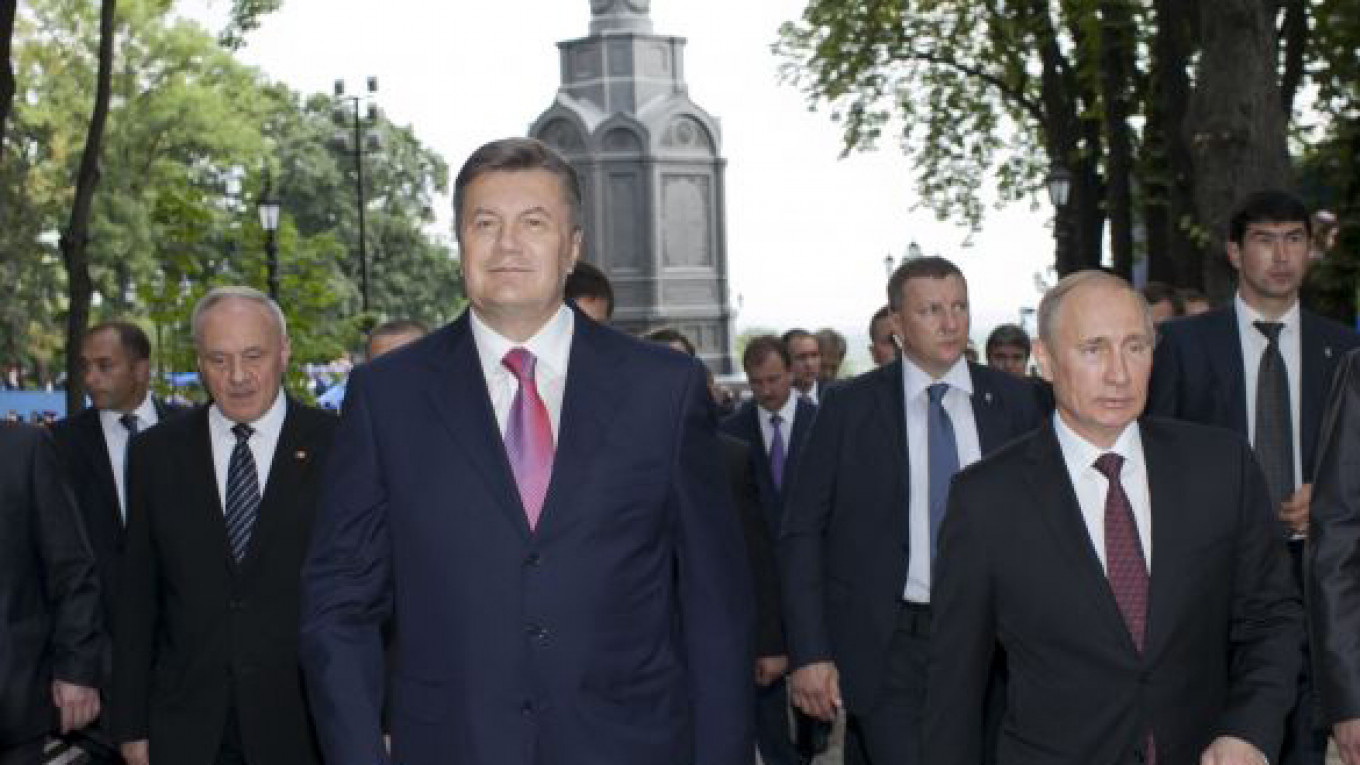KIEV — Ukrainian President Viktor Yanukovych on Saturday re-affirmed his commitment to signing key agreements with the European Union, including on trade, despite a threat by President Vladimir Putin of possible retaliatory measures.
Russia, the ex-Soviet republic's biggest trading partner, last week signaled growing alarm at Kiev's policy of European integration by conducting laborious extra customs checks on imports from Ukraine, causing delays at the border.
Though Russia ended the customs checks after a few days, Putin last Thursday added to fears in Kiev of a possible trade war by saying that a free trade deal between Ukraine and the EU might "squeeze out" Russian goods.
He warned that members of the Eurasian Customs Union linking Russia, Belarus and Kazakhstan might have to take "protective measures" to defend their markets.
In an Independence Day speech on Saturday, Yanukovych, once regarded as being more Russia-friendly than his nationalist predecessor Viktor Yushchenko, pointedly ignored Putin's comments.
While pledging to deepen relations with Russia and other customs union members, he indicated that Kiev was committed to signing agreements on political association and free trade with the EU at a summit in Vilnius, Lithuania, in November.
"For Ukraine, association with the European Union must become an important stimulus for forming a modern European state," he declared.
"At the same time, we must preserve and continue deepening our relations [and] processes of integration with Russia, countries of the Eurasian community, other world leaders and new centers of economic development," he said.
Ukraine's economy relies heavily on exports of steel, coal, fuel and petroleum products, chemicals and grain. More than 60 percent of its exports go to other former Soviet republics, with Russia, Belarus and Kazakhstan the most important.
Ukrainian commentators see last week's customs checks as a warning shot by Moscow providing a foretaste of what can be expected if Ukraine opts for turning toward Europe and away from its former Soviet ally.
Yanukovych, backed by powerful and wealthy business figures who see greater prosperity in European markets, has resisted entreaties by Moscow to join the Customs Union, a move which would be incompatible with a free trade agreement with the EU.
But with Kiev still hopeful of securing a lower price for deliveries of costly Russian gas for the Ukrainian economy, Yanukovych needs to maintain good relations with Moscow.
He is sending his prime minister, Mykola Azarov, there Monday to try to calm Russia's fears over Ukraine's moves toward Europe.
In an Independence Day message of congratulations to Yanukovych, Putin on Saturday avoided any discord, expressing Russia's readiness to increase cooperation with Ukraine across the board.
It is far from a foregone conclusion that a political association agreement, including a free trade deal, will be signed in Vilnius in November, even though Yanukovych wants it.
Many EU member states are disappointed at the pace of democratic reform in Ukraine since Yanukovych was elected in February 2010 and are pressing particularly for the release from jail of former prime minister Yulia Tymoshenko, his fiercest political adversary.
Tymoshenko was jailed in late 2011 for seven years for abuse of office after what the EU says was a politically motivated trial.
A Message from The Moscow Times:
Dear readers,
We are facing unprecedented challenges. Russia's Prosecutor General's Office has designated The Moscow Times as an "undesirable" organization, criminalizing our work and putting our staff at risk of prosecution. This follows our earlier unjust labeling as a "foreign agent."
These actions are direct attempts to silence independent journalism in Russia. The authorities claim our work "discredits the decisions of the Russian leadership." We see things differently: we strive to provide accurate, unbiased reporting on Russia.
We, the journalists of The Moscow Times, refuse to be silenced. But to continue our work, we need your help.
Your support, no matter how small, makes a world of difference. If you can, please support us monthly starting from just $2. It's quick to set up, and every contribution makes a significant impact.
By supporting The Moscow Times, you're defending open, independent journalism in the face of repression. Thank you for standing with us.
Remind me later.






